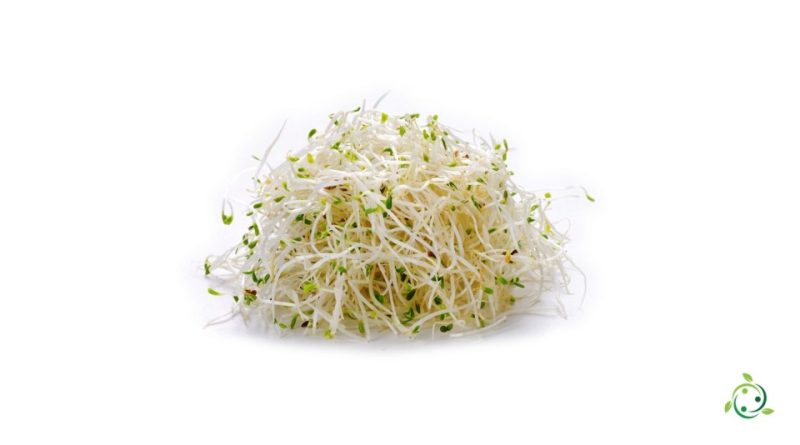Nutritional value of alfalfa sprouts
Nutritional value of alfalfa sprouts
Alfalfa (Medicago sativa L., 1753) is a herbaceous plant belonging to the Fabaceae family, native to south-western Asia, it is widespread in Italy mainly in Emilia-Romagna, Lombardy, Marche, Veneto, Calabria, Campania.
Characteristics –
Alfalfa is a perennial plant, with a taproot system that can reach a length of 3–5 m; it has a basal crown from which more or less erect stems originate that can reach one meter in height, hollow inside.
It has trifoliate leaves with an inflorescence consisting of a raceme of purple-blue zygomorphic flowers. The fruits are spiral legumes containing 2-6 seeds.
The seeds are very small (100 of them weigh 0.2 g).
In cultivation to take shoots, this can also make use of the seed sprouting technique and the use of young shoots or the taking of shoots from young seedlings.
Nutritional sheet –
Alfalfa sprouts, also known as alfalfa sprouts, have interesting nutritional characteristics; Below are the average values of typical nutritional values per 100 grams of alfalfa sprouts:
– Calories: approximately 23 kcal
– Protein: approximately 3.99 grams
– Carbohydrates: approximately 2.1 grams
– Fibers: approximately 1.9 grams
– Fat: approximately 0.69 grams
– Vitamin C: approximately 8.2 milligrams (14% of the recommended daily value)
– Vitamin K: approximately 30.5 micrograms (38% of the recommended daily value)
– Vitamin A: approximately 10 micrograms (1% of the recommended daily value)
– Folate: approximately 36 micrograms (9% of the recommended daily value)
– Calcium: approximately 32 milligrams
– Iron: approximately 0.92 milligrams
– Magnesium: approximately 27 milligrams
– Potassium: approximately 79 milligrams
Alfalfa sprouts are known to be a rich source of vitamins, minerals and antioxidants. They are often consumed as part of a healthy diet, often in salads, sandwiches or as an ingredient in various dishes.
Please note that these values may vary based on factors such as the freshness of the sprouts and growing conditions. It is always advisable to read the specific product’s nutrition label or consult a nutritionist for more precise information on the nutritional composition of the alfalfa sprouts you are consuming.
Property –
Alfalfa sprouts, also known as alfalfa, are small green shoots that grow from the Medicago sativa plant. These sprouts are known to be rich in nutrients and have several health-promoting properties. Here are some of the main properties of alfalfa sprouts:
1. Essential Nutrients: Alfalfa sprouts are a source of numerous essential nutrients, including vitamins (such as vitamin K, vitamin C, and B vitamins), minerals (such as calcium, magnesium, and iron) , proteins and fibre.
2. Antioxidants: They contain antioxidants such as vitamin C and vitamin A, which help protect cells from oxidative stress and fight free radicals in the body.
3. Reduce cholesterol: Some studies suggest that taking alfalfa sprouts can help reduce levels of LDL cholesterol (“bad cholesterol”) in the blood, which can be beneficial for heart health.
4. Natural Diuretic: Alfalfa sprout extracts have traditionally been used as natural diuretics, which can help promote the elimination of excess fluid from the body.
5. Alkalizing: Alfalfa sprouts are considered alkalizing foods, meaning they can help maintain the body’s pH balance, supporting overall health.
6. Digestion Benefits: The fiber found in alfalfa sprouts can help improve digestion and prevent digestive problems such as constipation.
7. Immune system support: Thanks to the presence of vitamin C, alfalfa sprouts can help strengthen the immune system and fight infections.
8. Source of Chlorophyll: Chlorophyll is a green pigment found in alfalfa sprouts, and is associated with health benefits, including purifying the blood and detoxifying the body.
9. Anti-cancer potential: Some preliminary research suggests that alfalfa sprouts may have potential anti-cancer properties due to the presence of beneficial phytochemicals.
10. Healthy Substitute: Alfalfa sprouts can be used as a healthy substitute for lettuce or other ingredients in salads, sandwiches and various dishes, adding extra nutrients to your diet.
It is recommended to consume fresh, high-quality alfalfa sprouts to maximize the health benefits. However, it is important to note that some people may be allergic to sprouts, so it is always best to consult a health professional before introducing them into your diet, especially if you have allergies or pre-existing health problems.

